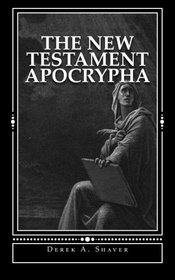Search -
The New Testament Apocrypha
The New Testament Apocrypha
Author:
The New Testament Apocrypha — A Definitive collection of New Testament Apocrypha — The New Testament Apocrypha are a number of writings by early Christians that claim to be accounts of Jesus and his teachings, the nature of God, or the teachings of his apostles and of their lives. These writings often have links with books regarded as "canonical".... more »
Author:
The New Testament Apocrypha — A Definitive collection of New Testament Apocrypha — The New Testament Apocrypha are a number of writings by early Christians that claim to be accounts of Jesus and his teachings, the nature of God, or the teachings of his apostles and of their lives. These writings often have links with books regarded as "canonical".... more »
ISBN-13: 9781480068209
ISBN-10: 1480068209
Publication Date: 10/8/2012
Pages: 508
Edition: Lrg
Rating: ?
ISBN-10: 1480068209
Publication Date: 10/8/2012
Pages: 508
Edition: Lrg
Rating: ?
0 stars, based on 0 rating
Publisher: CreateSpace Independent Publishing Platform
Book Type: Paperback
Members Wishing: 1
Reviews: Amazon | Write a Review
Book Type: Paperback
Members Wishing: 1
Reviews: Amazon | Write a Review
Genres:
- Reference
- Christian Books & Bibles >> Bible Study & Reference >> Bible Study >> New Testament
- Health, Fitness & Dieting >> Psychology & Counseling >> Apocrypha & Pseudepigrapha




